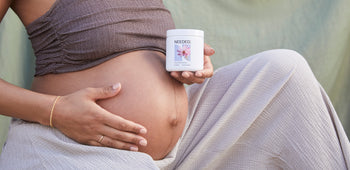Around the world, postpartum support encompasses a multitude of cultural traditions, yet if you look at the core of so many of them, most societies prioritize nurturing mothers through warming, high-protein dishes. These meals not only promote healing and combat depletion but also serve as a tangible expression of care and love from the community. By preparing and sharing these nourishing dishes, communities show solidarity with new mothers during this time of transition, ensuring they feel supported and cherished as they embark on the journey of motherhood.
We also know that we aren't all lucky enough to have folks in our lives to care for us like this in this period, but we wanted to share some recipes from around the world that you can either nourish yourself (perhaps even prepping pre-birth and freezing.) Or share with those who have offered to help but might not know how.
Khichdi (India)
Khichdi, a traditional Indian dish made from rice and lentils cooked with mild spices, is commonly consumed postpartum due to its gentle nature, easy digestibility, and nutritional richness. Its simple yet nourishing qualities provide essential nutrients and aid in the recovery process after childbirth, offering a source of carbohydrates, proteins, and vitamins crucial for healing and lactation. Additionally, the mild spices in khichdi stimulate appetite and aid digestion without overwhelming the senses, while its versatility allows for easy customization to suit individual preferences and nutritional needs, making it a popular choice for postpartum nourishment in Indian households.
Ingredients:
-
1 cup rice
-
1/2 cup split moong dal (yellow lentils)
-
1 tbsp ghee (clarified butter)
-
1 tsp cumin seeds
-
1/2 tsp turmeric powder
-
Salt to taste
-
4-5 cups water
Instructions:
-
Rinse the rice and lentils thoroughly and soak them for 15-20 minutes.
-
Heat ghee in a pressure cooker or pot. Add cumin seeds and let them splutter.
-
Add the soaked rice and lentils, turmeric powder, and salt. Mix well.
-
Pour in the water, stir, and bring to a boil.
-
Reduce the heat, cover, and cook until the rice and lentils are soft and mushy.
-
Serve warm, optionally garnished with a drizzle of ghee.
Congee (China)
Congee, a traditional Chinese rice porridge, is commonly consumed postpartum due to its gentle, easily digestible nature and nourishing properties. Its soft texture and versatility make it an ideal source of carbohydrates and nutrients for postpartum recovery, aiding digestion and replenishing energy stores during this critical period. Congee's adaptability allows for variations in ingredients, making it a popular choice for postpartum nutrition in China.
Ingredients:
-
1 cup jasmine rice
-
8 cups water or chicken broth
-
1-inch piece of ginger, sliced
-
Salt to taste
-
Optional toppings: shredded chicken, chopped scallions, soy sauce, sesame oil
Instructions:
-
Rinse the rice thoroughly.
-
In a large pot, combine the rice, water or broth, and ginger.
-
Bring to a boil, then reduce the heat and simmer for 1-2 hours, stirring occasionally, until the rice breaks down and the congee thickens.
-
Season with salt to taste.
-
Serve hot with optional toppings.
Caldillo de Pollo (Mexico)
Caldillo de Pollo is a Mexican chicken soup known for its comforting and nourishing qualities, often cooked to support recovery and well-being. The dish typically includes chicken cooked in a savory broth with vegetables such as carrots, potatoes, and chayote, along with aromatic herbs and spices. Postpartum in Mexico is regarded as a time when new mothers require special care and nutrition to aid in their physical recovery and lactation. Caldillo de Pollo is favored for its gentle flavors and nutrient-rich ingredients, offering protein, vitamins, and minerals essential for postpartum healing and breastfeeding. Additionally, the warmth and soothing nature of the soup can provide comfort and relaxation during this period of transition, making it a popular choice for postpartum nourishment in Mexican culture.
Ingredients:
-
2 tbsp olive oil
-
1 onion, chopped
-
2 garlic cloves, minced
-
2 carrots, chopped
-
2 celery stalks, chopped
-
1 large tomato, chopped
-
6 cups chicken broth
-
2 chicken breasts, cooked and shredded
-
1/2 tsp cumin
-
Salt and pepper to taste
-
Fresh cilantro, chopped (optional)
-
Lime wedges for serving
Instructions:
-
Heat olive oil in a large pot over medium heat. Add onion and garlic, sauté until soft.
-
Add carrots, celery, and tomato. Cook for a few minutes until vegetables start to soften.
-
Pour in the chicken broth and bring to a boil.
-
Add the shredded chicken, cumin, salt, and pepper. Simmer for 20-30 minutes.
-
Garnish with fresh cilantro and serve with lime wedges.
Osh Pyozee (Uzbekistan)
Osh Pyozee, a traditional Uzbek dish of rice cooked with meat, onions, carrots, and spices, is favored postpartum in Uzbekistan for its nourishing qualities. Rich in protein from meat and carbohydrates from rice, it replenishes energy and supports lactation, while the addition of onions, carrots, and spices aids in recovery and digestion, making it a comforting and nutritious choice for new mothers.
Ingredients:
-
1 cup short-grain rice
-
1 cup chickpeas, soaked overnight and drained
-
1 onion, finely chopped
-
1 carrot, grated
-
1 tbsp vegetable oil
-
2 cups lamb or beef broth
-
1 tsp cumin
-
Salt and pepper to taste
-
Fresh dill or cilantro for garnish
Instructions:
-
Heat oil in a large pot over medium heat. Add onion and sauté until golden.
-
Add grated carrot and cook for a few more minutes.
-
Stir in the soaked chickpeas and rice.
-
Pour in the broth, add cumin, salt, and pepper. Mix well.
-
Bring to a boil, then reduce heat, cover, and simmer until the rice and chickpeas are tender, about 30-40 minutes.
-
Garnish with fresh dill or cilantro and serve warm.














